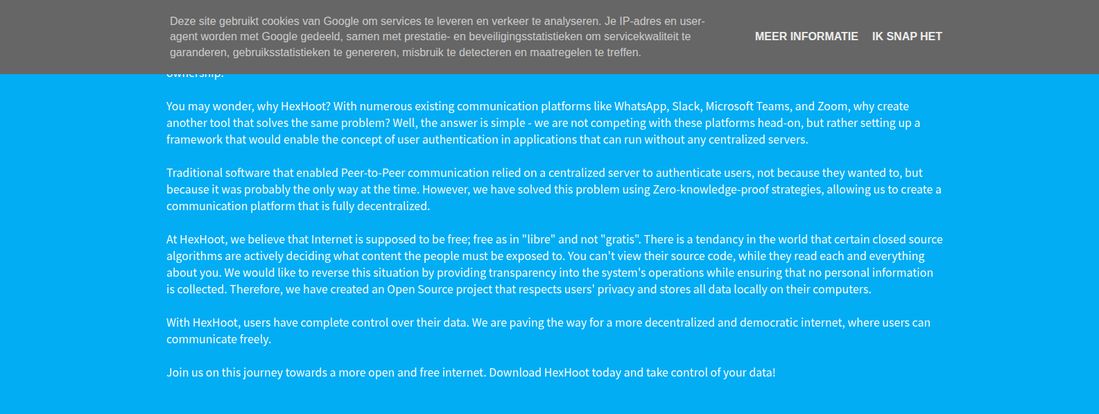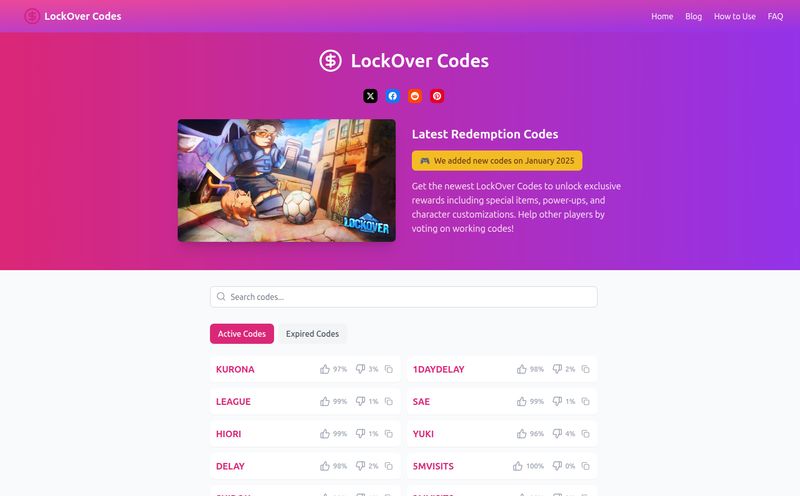I spend my days swimming in the digital currents of SEO, traffic, and user data. It’s my job. And after years of watching the big platforms—you know who they are—turn our personal data into their personal goldmine, you get a little jaded. Every new app promising “privacy” gets a healthy dose of side-eye from me. So, when I stumbled upon a project called HexHoot, my skepticism was already firing on all cylinders.
Another messaging app? Great. Just what the world needs.
But then I started digging, and what I found wasn't just another WhatsApp clone with a different color scheme. It was something... different. Something more foundational. HexHoot isn't really trying to be the next big chat app you force your family to download. Instead, it’s aiming to be the engine for a whole new generation of apps that don't need to phone home to a central server. And honestly, that got my attention.
What Is HexHoot, Really?
Let's get one thing straight. The folks behind HexHoot say it themselves: they aren't competing with Slack or Zoom head-on. Thank goodness. That's a losing battle. What they are doing is building a framework. Think of it like this: instead of building a new, shiny car, they're building a revolutionary type of engine that any carmaker could, in theory, use. An engine that runs on a completely different kind of fuel.
That fuel is decentralization. For ages, even peer-to-peer (P2P) apps needed a central server to act as a bouncer—someone to check IDs at the door and verify that you are who you say you are. HexHoot's big claim is that they've solved this problem. They’ve built a bouncer that lives everywhere and nowhere all at once, using a bit of cryptographic wizardry called Zero-Knowledge Proofs.

Visit HexHoot
The Magic Behind the Curtain: Zero-Knowledge Proofs
Okay, stay with me. The term “Zero-Knowledge Proof” (or ZKP) sounds like something out of a sci-fi novel, but the concept is surprisingly intuitive. It’s a way for you to prove you know a secret—like a password or a private key—without actually revealing the secret itself.
Imagine you have a key to a special room. To prove to me you have the key, you don’t need to show it to me. You could just unlock the door and walk in. I see the result (the door is open) and know you must have the key, but I never saw the key itself. That's the gist of a ZKP. It’s a massive deal for privacy and security. By using this, HexHoot allows users to authenticate themselves across a network without ever sending their credentials to a central authority that could be hacked, subpoenaed, or abused.
A Philosophy of Freedom, Not “Freebies”
Here’s the part that really resonated with me. On their site, HexHoot makes a crucial distinction. They say they believe the internet should be “free as in 'libre' and not 'gratis'.” This isn't just semantics; it's a worldview. Libre means freedom. Gratis just means it doesn’t cost money. As we all know, if a service is gratis, you are the product.
HexHoot is a direct counter-argument to that model. It’s open source, which means anyone can inspect the code to see what it's doing. There are no shadowy algorithms deciding what you see. And your data? It’s stored on your own computer. Not on a Google server farm in Iowa, not on an Amazon S3 bucket. Yours. What a concept.
“There is a tendency in the world that certain closed source algorithms are actively deciding what content the people must be exposed to. We would like to reverse this situation by providing transparency…” - The HexHoot Team
This commitment to data ownership and transparency is the heart and soul of the project. Its a bold, almost rebellious stance in an industry built on data extraction.
Let’s Be Realistic: The Hurdles Ahead
Now, I’m not a complete idealist. I’ve been around the block, and I see the potential roadblocks for a project like this. It’s not all sunshine and decentralized roses.
Is It Too Techie for a Takeover?
The first hurdle is usability. The documentation hints that setup might require some technical chops. This is often the trade-off for having more control and privacy. It's not a one-click install from the app store, at least not yet. For the project to gain wider acceptance, it'll need to bridge this gap for the average, non-technical user who just wants to chat with their friends.
The Lonely Network Problem
The biggest challenge for any communication platform is the network effect. A phone is useless if there's no one to call. HexHoot faces the monumental task of convincing people to move away from the established giants where everyone already is. This is less a technical problem and more of a social one, and it's the graveyard where many amazing projects have gone to die.
What Happens When Your Friends Are Offline?
Finally, there's the nature of P2P itself. A decentralized network relies on its peers. If the person you're trying to communicate with is offline, the connection can't always be made instantly. It's a different model from the always-on, server-based world we're used to, and it might require a shift in user expectations.
And for a quick bit of meta-commentary, while I was digging around, I tried to find their blog. The result? A 'Page not found' error. I had to laugh. It feels oddly appropriate. They are so focused on building the core tech for a new internet that they haven't had time for the old one's window dressing. I kinda respect the hustle.
So, Who Is This For?
Right now, I don't think HexHoot is for my grandma. It's for the builders, the pioneers, the privacy advocates, and the developers who are sick of the status quo. It’s a tool for those who want to create applications where user ownership and privacy aren’t afterthoughts but the very foundation. It’s for anyone who hears the words “decentralized internet” and feels a spark of excitement rather than confusion.
It’s a bet on a different future. A future where our conversations belong to us, and the platforms are just the pipes, not the eavesdroppers. And that's a bet I'm willing to watch with real interest.
Frequently Asked Questions About HexHoot
- Is HexHoot a replacement for WhatsApp or Slack?
- Not directly. It's more of a foundational technology or framework that developers can use to build decentralized applications, including chat apps. Its main goal is to solve user authentication without central servers.
- Is HexHoot completely free?
- It's free in two ways. It's 'gratis' (costs no money) and 'libre' (it grants you freedom). As an open-source project, you can download and use it freely, and its code is open for anyone to inspect, modify, and share.
- What is a Zero-Knowledge Proof in simple terms?
- It’s a cryptographic method that lets you prove you know something (like a password) to someone else without revealing what that thing is. Think of it as proving you have a key by opening a lock, without ever letting the other person see the key.
- Do I need to be a programmer to use HexHoot?
- Currently, setting up and using a platform like HexHoot may be more suited to those with some technical knowledge. As the project develops, it will likely become more user-friendly for a broader audience.
- Where is my data stored when using HexHoot?
- According to their philosophy and design, all your data is stored locally on your own computer. It is not uploaded or held on any centralized company servers, giving you complete control.
- Why is being open source so important for a privacy tool?
- Open source builds trust. When the code is open, the global community of developers and security experts can audit it to ensure it's not doing anything malicious and that its privacy claims are true. You don't have to just take the company's word for it.
Conclusion
HexHoot is an ambitious project. It’s not just an app; it’s a statement. In a world where our digital lives are increasingly controlled and monetized by a handful of corporations, projects like this are more than just technical experiments—they are necessary acts of defiance. It might not be the platform that everyone uses tomorrow, but the ideas it's built on—true data ownership, cryptographic trust, and a free, libre internet—are the building blocks for a better digital world. And that's something worth getting excited about.
References and Sources
- HexHoot Official Website: hexhoot.com
- Zero-Knowledge Proofs Explainer by a16z crypto: An Introduction to Zero-Knowledge Proofs
- Electronic Frontier Foundation (EFF) on Privacy: eff.org/issues/privacy



